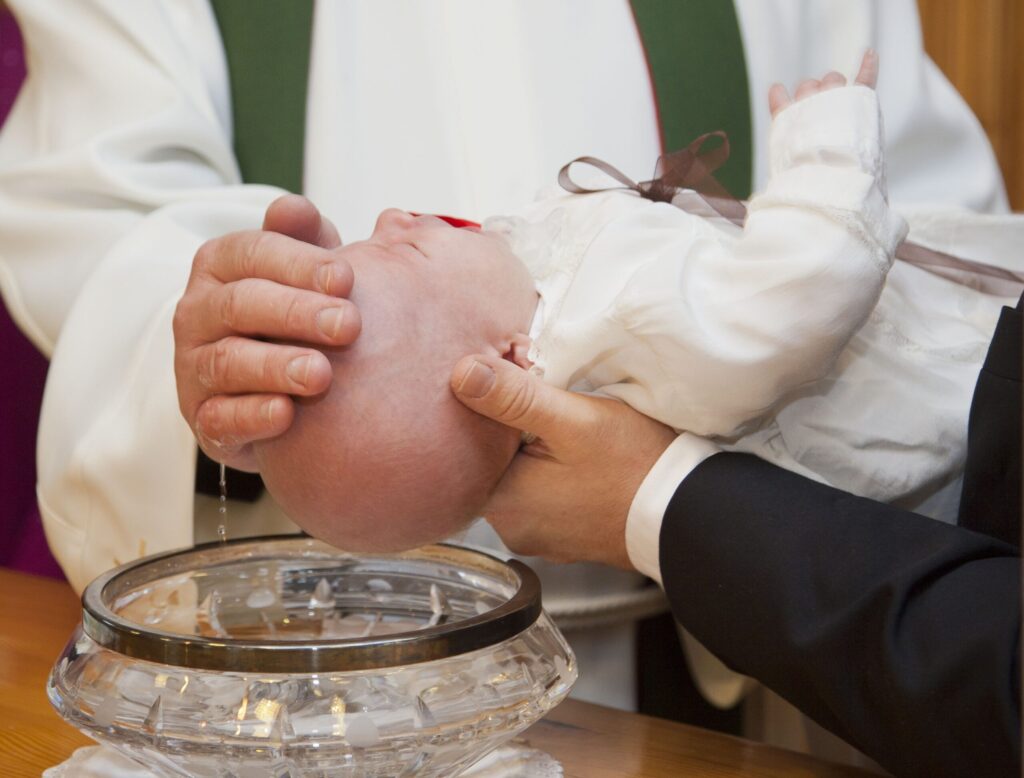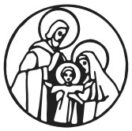Baptism
For those under the age of seven.
Baptism means to “plunge” into the life which was modeled by Christ. Baptism tells us:
- Our lives are not all about us.
- We will suffer.
- We are never alone!
Parents who ask that their child be baptized into Christ have the most significant part to play in passing on the Christian life. It is through you that your child will come to know the love of God. It is through you that your child will become involved in the larger community in which he/she lives. Through you, your child will acquire an awareness of being a living and active member of the church.
Bringing your child to the baptismal font expresses your commitment to raise your child in the Catholic faith. This faith needs to be awakened, strengthened and developed as the child matures. To present your child for baptism is to accept responsibility for the growth of that faith.
Parents should baptize their child, not because it is the custom, but because they sincerely desire the Christian life for their child. Later, your child’s faith will be based on what he/she has learned and experienced in your home and community from the very first days of life.
The responsibility of Christian parents is holy, important, and often difficult. Therefore, it is very understandable that you should invite family and friends to assist in the responsibility of raising your child Catholic. It is the godparents who most explicitly assume the responsibility with the parents and should be ready to help the parents raise their child in the knowledge of the Lord.
“Holy Baptism is the basis of the whole Christian life, the gateway to life in the Spirit, and the door which gives access to the other sacraments. Through Baptism we are freed from sin and reborn as sons and daughters of God; we become members of Christ, are incorporated into the Church and made sharers in her mission…”
(Catechism of the Catholic Church, 1213)

“In those days Jesus came from Nazareth of Galilee and was baptized by John in the Jordan. And just as he was coming up out of the water, he saw the heavens torn apart and the Spirit descending like a dove on him. And a voice came from heaven. “You are my Son, the Beloved. With you I am well pleased.”
– Mark 1:9-11
Why does the Church adhere to the practice of infant Baptism?
From antiquity the Church has practiced infant Baptism. There is one reason for this: before we decide on God, God has decided on us. Baptism is therefore a grace, and under-served gift of God, who accepts us unconditionally. Believing parents who want what is best for their child want Baptism also, in which the child is freed from the influence of original sin and the power of death.
Infant Baptism presupposes that Christian parents will raise the baptized child in the faith. It is an injustice to deprive the child of Baptism out of a mistaken liberality. One cannot deprive a child of love so that he can later decide on love for himself; so too it would be an injustice if believing parents were to deprive their child of God’s grace in Baptism. Just as every person is born with the ability to speak yet must learn a language, so too every person is born with the capacity to believe but must become acquainted with the faith. At any rate, Baptism can never be imposed on anyone. If someone has received Baptism as a little child, he must “ratify” it later in life – this means he must say “yes” to it, so that it becomes fruitful.
Who can administer Baptism?
Normally a bishop, a priest, or a deacon administers the Sacrament of Baptism. In an emergency, any Christian, indeed anyone, can baptize by pouring water over the head of the recipient and pronouncing the baptismal formula, “I baptize you in the name of the Father and of the Son and of the Holy Spirit.”
Baptism is so important that even a non-Christian can administer it. In doing so, however, he must have the intention of doing what the Church does when she baptizes.
What happens in Baptism?
In Baptism we become members of the Body of Christ, sisters and brothers of our Redeemer, and children of God. We are freed from sin, snatched from death, and destined from then on for a life in the joy of the redeemed.
Being baptized means that our personal life story is submerged in the stream of God’s love. “Our life”, says Pope Benedict XVI, “now belongs to Christ, and no longer to ourselves…. At his side and, indeed drawn up in his love, we are freed from fear. He enfolds us and carries us wherever we may go—he who is Life itself.” (April 7, 2007).
What is the significance of receiving a name in Baptism?
Through the name that we receive in Baptism God tells us: “I have called you by name, you are mine.” (Is 43:1).
In Baptism a person is not dissolved into an anonymous divinity, but rather is affirmed precisely in his individuality. To be baptized by a name signifies that God knows me; he says “yes” to me and accepts me forever in my unrepeatable uniqueness.
Why should Christians choose the names of saints at Baptism?
There are no better examples than the saints and no better helpers. If my namesake is a saint, I have friend with God.
QUICK GUIDELINES FOR BAPTISM IN THE ROMAN CATHOLIC CHURCH
Through Baptism, God enables us to participate in his life in Jesus Christ and makes us his children. It is through this Sacrament that we receive the Holy Spirit and become members of the People of God, of the Body of Christ, which is the Church. Baptism becomes our commitment to grow in this new life and to strive to acquire spiritual maturity. By baptism, God purifies us from sin. Intimately linked to Confirmation and to Eucharist, Baptism is, with these two sacraments, Christian Initiation. The child is baptized in the faith of their parents, godparents and of the Church.
Basic Guidelines and Information for Infant (to include young children)
Parents are responsible for bringing their child to the Sacrament of Baptism as soon after birth as possible. Except in case of necessity, the church is the usual place of baptism.
In order that a child be baptized, it is necessary that the parents consent, or at least one of them, or someone legally standing in their place, and that there is reasonable hope that the child will be brought up in the Catholic Faith.
Godparents
A person may only have one or two godparents (also called sponsors); if two are chosen, they must be male and female.
In order for someone to be eligible as a godparent they must be chosen by the parents, have the ability and the intention to fulfill the role, be at least 16 years of age, and be a confirmed Roman Catholic, who has already received the Most Holy Eucharist, is leading a life in harmony with the Catholic Faith (including Marriage) and will be a good role model for the one being baptized, and be neither the father nor the mother of the child.
A baptized person who belongs to another Christian community may be admitted only as a “Christian witness” (not a godparent) provided that there is at least one Roman Catholic godparent who fulfills the above criteria. A non-baptized person cannot be a witness (Code of Canon Law, cc. 872-874; Catechism of the Catholic Church 1255).
Baptismal Preparation in your Parish
In order to respect your request for the baptism of your child, you are invited to follow closely the stages of preparation offered below:
– Contact your parish office and express your desire to have your child baptized.
– Introduce yourself to the parish priest if you do not already know him personally.
– Open yourself to the invitation to actively join the faith community of your parish and register as parishioners.
– attend the celebration of the Sunday or Saturday Evening Mass weekly.
Babies of non-practicing parents cannot be baptized (except in danger of death)
What the Church has in mind is this: It doesn’t want the non-practicing parents to think of baptism as simply a custom with no responsibilities attached.
To baptize a child but not educate him in the faith is a grave disservice. It could leave a child with a distorted vision of baptism and of the value of the Catholic faith, as if they were cultural oddities with no real impact on his moral life. (Baptism is, however, allowed if a baby is in danger of death.)
The Church hopes that its norms on baptism could be a wake-up call to parents — a signal that they need to get serious about their faith and about passing it on to their children. Parents will have to answer before God someday for how well (or poorly) they fulfilled their duty to teach their children the faith.
If the Church allowed baptism with no further requirements on parents, the importance of this Sacrament could quickly be lost.
The Church, as guardian of the Sacraments is not trying to deny anything to anyone, but rather to challenge in a wholesome way Catholic parents to live up to their mission of educating their children in the Catholic Faith.
Baptism of a child from unmarried Parents
It is possible to baptize a child of an unmarried couple, as long as there seems to be a sincere effort to raise the child in the Catholic faith.
There needs to be clear evidence that the mother and father of the child intend to bring the child up in a Christian home. Once the child is old enough, the parents should be bringing him/her to Mass with them every Sunday/Saturday Evening (unless sickness, injury, etc., prevents it).
The parents are also to ensure that the child will receive the Sacraments First Communion and Confirmation of the Church, together with a Catholic education at least in the home, supplemented by a Catholic school education or a Parish CCD Program.
A sincere effort to raise the child in the Catholic faith would include that the couple would be working on getting married in the Church.
If they are working on getting married in the Church, then the priest could be willing to baptize their child.
Baptismal Preparation
While baptismal preparation varies from parish to parish, you will be invited to participate in some manner of faith formation prior to the baptism of your child. This may take the form of a meeting with the pastor a Couple in our parish who hosts a baptismal preparation session for parents.
It is extremely important to take your faith-life seriously because, before God, you have taken on an awesome responsibility for the salvation of another—your own child!
Your commitment and openness to baptismal preparation will help develop the faith-life of your child as they mature.
BAPTISM FOR PARENTS HAVING A CHILD BAPTIZED FOR THE FIRST TIME
The first time parents prepare for the Baptism of a child, the parents review a booklet and video, obtained at the Parish Office, on the Sacrament of Baptism to deepen their understanding of their role in the religious formation of the child.
The parents then discuss this booklet and video with a trained member of the parish.
After this discussion the parents may contact the Pastor to schedule the baptism, which may be done during certain Weekend Masses or anytime outside of Mass convenient to the family and Fr. Tom or Deacon Greg.
FOR PARENTS WHO HAVE ALREADY HAD A CHILD BAPTIZED
Parents may contact the Pastor to schedule the baptism, which may be done during certain Weekend Masses or anytime outside of Mass convenient to the family and Fr. Tom or Deacon Greg.
About Godparents
The parent of the child chooses the godparent. Two godparents may be chosen, but only one is required to meet the following requirements of Canon Law:
A godparent must:
- Be at least 16 years old.
- Not be the child’s parent.
- Be a practicing Catholic in good standing (attends Mass weekly) who has received the Sacraments of Baptism, Confirmation, and the Eucharist.
- Be a registered member of this parish, or provide a letter of eligibility from their own parish.
Two godparents may be chosen. Both must meet the requirements listed above. Reflecting natural parents, one godparent is to be male and one is to be female.
A witness may also be chosen along with a godparent. Either gender is permitted. In this case, they must:
- Be at least 16 years old.
- Not be the child’s parent.
WHAT DO THE BAPTISM SYMBOLS MEAN?
Sign of the Cross
The sign of the cross is the mark of Christians because Jesus Christ died on the cross. Parents and godparents trace it on the child’s forehead to show that the baby belongs to Christ, who now offers his help and grace to face and overcome the sufferings of life.
Water
Water is a symbol of both life and death. Its use in Baptism is central to the sacrament representing taking on a new life in Christ.
Immersion is a more dramatic and powerful water ritual. In immersion at Assumption, the child’s body (but not the child’s head) is immersed into the baptismal water, symbolizing that the newly baptized is dying to sin and rising to new life. Immersion is most similar to the Baptism performed by early Christians.
Candle
The baptismal candle is a symbol of the light of Christ which is coming into the child’s life.
The Paschal [Easter] Candle is always lit during Baptism ceremonies. The Paschal Candle represents the light of Christ, and it is from this flame that your baptismal candle will be lit.
The lit candle is presented to the baptized, held by the father, mother or a godparent during the remainder of the ceremony. The presentation of light represents how the newly baptized will become a son or daughter of “the light.” The flame symbolizes the flame of faith which will burn through the life of your child.
We encourage the use of the baptismal candle at family birthday celebrations to celebrate the anniversary of being baptized into the Christian family.
White Garment
White is a symbol of transition and change; purity and cleansing. It is a sign of innocence and the new life of resurrection. Its use in the baptism is a visible sign of putting on Christ, of taking on a new way of life.
Oil
Chrism means “to anoint.” This Oil of Chrism is olive oil, perfumed with special spices and blessed by the bishop on Holy Thursday. In the baptismal ceremony it is used to anoint the head of the newly baptized. This oil is also used to anoint someone in the sacraments of Confirmation and Ordination. The sweet smell is also an outward indication to the world that something has changed about the baptized – they have a “different scent” about them.
The Priest or Deacon may also choose to anoint the breastbone during the Baptism ceremony with the Oil of Catechumens. This oil is a symbol of the power and strength which comes from Jesus.
The anointing of the heads of the newly baptized with chrism is accompanied by the celebrant saying, “God the Father of our Lord Jesus Christ has freed you from sin, given you a new birth by water and the Holy Spirit, and welcomed you into his holy people. He now anoints you with the chrism of salvation. As Christ was anointed Priest, Prophet, and King, so may you live always as a member of his body, sharing everlasting life.”
>>https://formed.org/home?code=4RPJKT#modal-open
Parish code for formed.org is 4RPJKT

